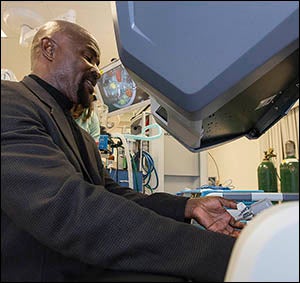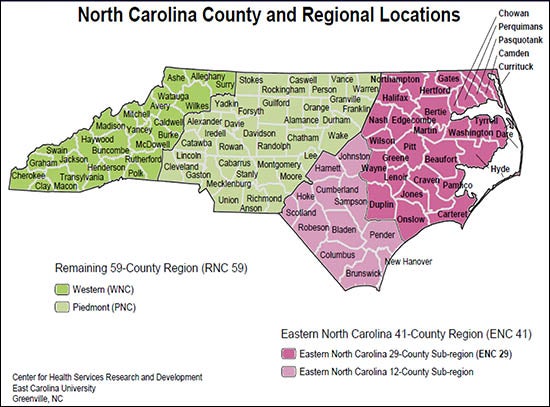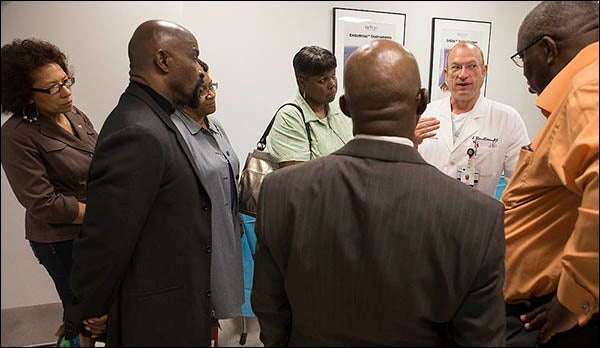A HEALTHY MESSAGE
The youth in the Rev. Richard Joyner’s church in Conetoe already are health ambassadors, growing vegetables and teaching neighbors about healthy lifestyles.
Joyner recruited more ambassadors April 26 as pastors from eastern North Carolina toured the Brody School of Medicine to learn about East Carolina University’s resources to share with their congregations and communities.
Developing relationships and creating partnerships in the communities that Brody serves is important in preventative health, said Dr. Paul Cunningham, dean of the Brody School of Medicine.
“Coming today is one of the processes to help us to understand what the resources are and to help us do preventative health, and not go to the emergency room for health care,” said Joyner, who also is director of pastoral care at Nash Health Care. Often clergy are involved when a church or family member of a congregant enters the hospital. “We want to reduce admissions by increasing education and the health of our community.”

Richard Joyner of Conetoe Chapel Missionary Baptist Church sits at the console where physicians from all over the world learn to operate the da Vinci robotic surgery equipment.
Eastern North Carolina’s health challenges include asthma, diabetes, stroke, high blood pressure, cardiovascular disease and obesity. Joyner’s county, Edgecombe, is representative of the region’s health maladies, which are two to five times higher for minority groups. North Carolina ranks as the 17th most obese state in the nation, and the South had the highest prevalence of obesity in 2011, according to the Centers for Disease Control and Prevention.
Joyner said he was performing more burials than weddings when he started at Conetoe Chapel Missionary Baptist Church 10 years ago. So the church initiated weekly education and exercise classes to empower local residents to take charge of their health. Since the exercise class began, one teen has lost 100 pounds and another wants to be a nurse anesthetist.
This summer, youth will to go door to door in a 20-mile radius around Conetoe, population 365, to survey 200 households about their lifestyle, medications and health history and create a health passport.
The church also started a 12-acre community garden and has 50 beehives, providing access to healthy foods. “It’s youth-driven,” he said. “The message is you don’t have to wait to be in a health care field. We’ve got to see ourselves as accountable and sustain our community partnerships.”
Joyner said Conetoe is a small community that wants to have a big impact. “We talk about ‘field to fork.’ We’re trying to put a real relationship with food and one’s physical life, spiritual life and educational life. If we get these right, we’re going to produce healthy resources.”
“The model you’re creating is something I tell people about all over the country,” said Cunningham, who would like to see it replicated across the region. “If it helps the community, it helps us.”
Cunningham told a story about a recent trip to visit his mother and uncle in Jamaica. He said he put on five pounds in three days with three hearty meals prepared for him each day including ackee and saltfish, a Jamaican favorite. “It goes right here,” said Cunningham, patting his mid-section. The same is true for salty pork dishes to desserts. “I’m not saying you can’t eat it at all, but do it three times a year, once in a while, not every day.”
Physicians recommend a diet loaded with fruits and vegetables combined with moderate exercise. Children need at least 60 minutes of exercise each day. Only half of high school students report they get the recommended amount, Cunningham said.
“The challenge in health is clear,” Joyner said. “Today is a beginning to get our communities over here, to get the medical students and nursing students in our communities more often, not just for health fairs, but to determine how we change lifestyles, which is a huge piece.”
Pastors toured the robotics lab in the Warren Life Sciences Building, the East Carolina Heart Institute at ECU and the pulmonology clinic and endoscopy center in Moye Medical Center.
The Rev. Roy Gray, pastor of Cedar Hill Missionary Baptist Church in Williamston, said the tour was an eye-opener. “We really need to get the word out,” he said, after trying his hand on the DaVinci Surgical System in the ECU Robotic Research and Training Center. “A lot of people don’t have a clue this equipment exists in eastern North Carolina.”

